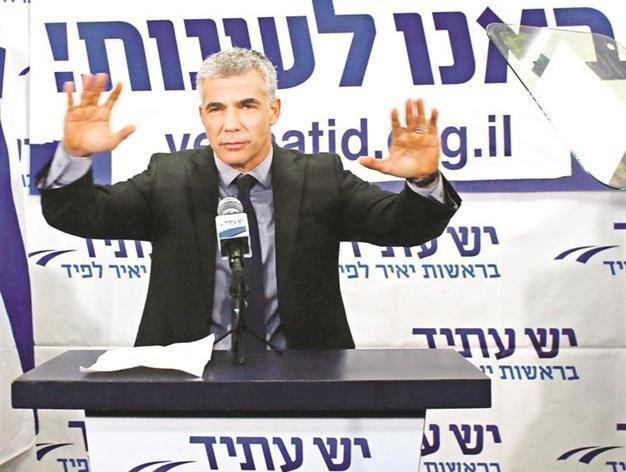Israeli TV presenter becomes kingmaker
İrem Köker - JERUSALEM / Hürriyet

Yair Lapid, leader of the Yesh Atid (There is a Future) party, gestures in front of supporters at his party’s headquarters in Tel Aviv January 23, 2013. The surprise star of Israel’s election on Tuesday is Lapid, a former television news anchor whose centrist party, exit polls showed, soared to second place in the balloting only months after he joined politics. REUTERS/Ammar Awad
The Israeli election has put a former TV news anchor and political novice, Yair Lapid, in the role of kingmaker. He has signaled he will use his power to try to move Netanyahu’s next government to more centrist positions on the Middle East peacemaking process.Yair Lapid, 50, used to be a commentator with Israeli daily Yediot Aharonot and a presenter on Channel 2. He announced in January 2012 that he was planning to leave journalism to enter politics.
Despite a privileged start in life, including a famous father with his own storied political career, Lapid’s creation of the Yesh Atid party has seen him take on the mantle of defender of Israel’s middle class.
“We are not a center-left party, we are a center-center party,” he told Jerusalem Post earlier this month. “We are the party of the Israeli middle class, the old-fashioned taxpayers who served in the army and afterwards worked hard all their life paying a high tax and see... that the cost of living is going up and up and there’s no equality of burden with the other parts of Israeli society.”
Lapid is the son of the fiercely secular former Justice Minister Yossef “Tommy” Lapid, another journalist who left the media to enter politics. He headed Shinui, a party which won 15 seats in 2003, but has since faded into obscurity.
Lapid named the party Yesh Atid, Hebrew for “There is a future,” and sought to build a party list that could attract a broad spectrum of Israel’s fractious electorate.
He led a low-profile campaign focusing on economic and secular rather than territorial issues.
He called for removal of the inequalities in the national service, by ending exemptions for the ultra-Orthodox community, a state of affairs to which there is growing opposition in the country.
He has also insisted on a continuation of peace talks with the Palestinians, and fewer supports for Israeli settlements in the West Bank. He has said he favors negotiations.
“Yesh Atid will not join a government that will not conduct diplomatic negotiations,” he said in remarks quoted in Haaretz in October.
“You don’t come to negotiations only with an olive branch, the way the left does, or only with a gun, the way the right does,” he said in a speech at the Ariel settlement deep in the West Bank.
“You come to find a solution. We’re not looking for a happy marriage with the Palestinians, but for a divorce agreement we can live with.”
















